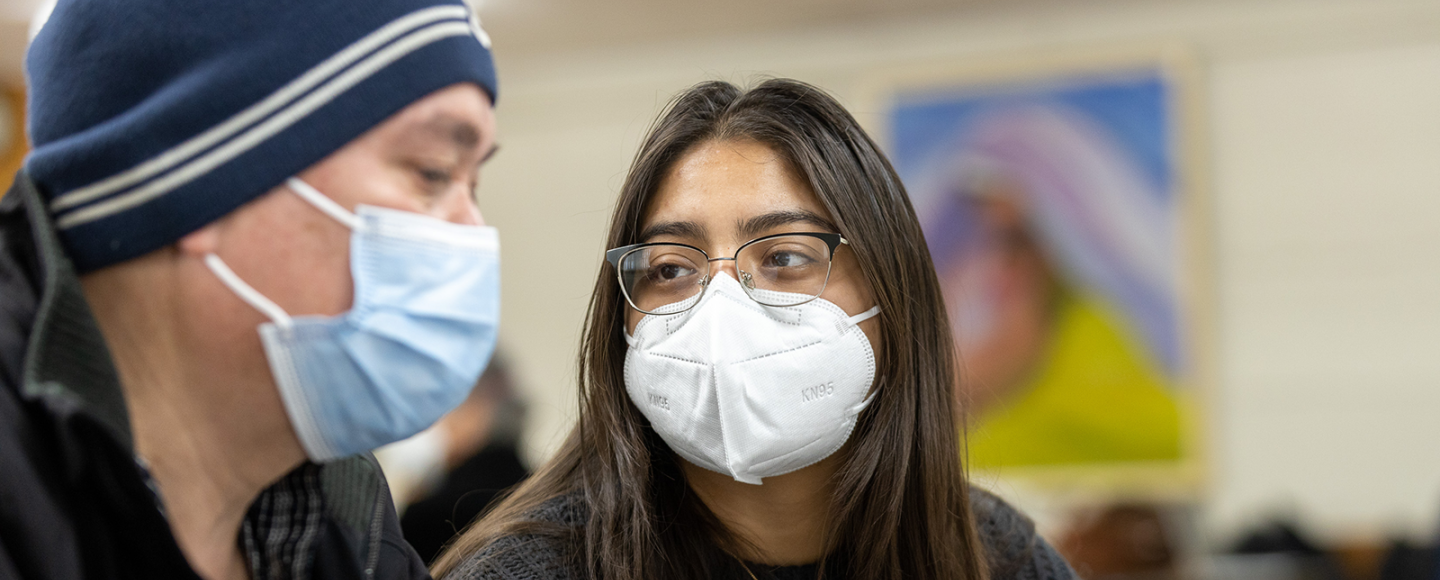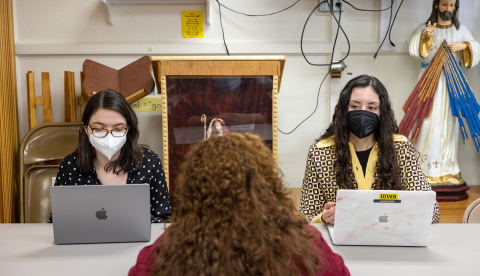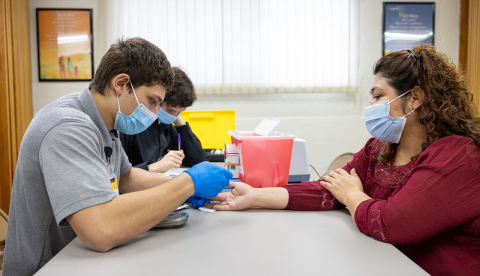Table of ContentsClose

Medicine on the move: Mobile Clinic celebrates 20 years
For one Sunday morning each month, the basement of the Church of Saint Joseph in Columbus Junction, Iowa, is transformed into a temporary clinic. What looks like a hodgepodge of biblical art and medical supplies is part of a carefully planned and executed effort to provide free health care to underserved and uninsured area residents.
A group of undergraduate and medical students carpool 40 minutes to this town of 1,800 people every month to provide medical care and education to community members.
Some are there to check their blood pressure while others want to make sure they are managing their diabetes correctly.
The big picture
Adamari Peña, clinic coordinator and pre-med student, translates for a patient during a University of Iowa Mobile Clinic held in the Church of Saint Joseph in Columbus Junction, Iowa. To pull off its outreach efforts, the Mobile Clinic requires a large scope of support. Depending on their level of training, student volunteers provide interpretation services, complete labs and vitals, perform physical exams, and more.
“Anybody can show up at these clinics,” says Denise Martinez, MD (11R), clinical associate professor of family medicine in the University of Iowa Carver College of Medicine and co-director of the nonprofit clinic. “We go into communities where the folks are, so it's convenient. For example, West Liberty has a large Latinx population, and the factory there runs six days a week. So, we do the clinic on Sunday, the day the factory isn't working. And it's after church. This works for their community.”
In 2022, the Mobile Clinic celebrates 20 years of service as it continues to offer free medical care for immigrants and refugees, homeless people, those who are returning from incarceration, migrant workers, low-income residents, and whoever else may need primary and preventive care.
Before bringing its services to 14 sites in and around Iowa City—in school gymnasiums, senior centers, and churches—the clinic operated completely out of a refurbished bus. Its growth and establishment in several eastern Iowa communities is supported by the nearly 60 health sciences students who currently serve on the organization’s board, and hundreds more student volunteers who provide interdisciplinary clinical services ranging from eyeglasses fittings to physical therapy.
“When our patients come in and we can teach them a lot of health literacy—especially when we're one of the first health organizations that they've interacted with—that’s important,” says Andrea Arthofer, a fourth-year medical student and the operations director of the clinic. “We can make that a positive experience for them.”

Two decades of growth
Although its mission has remained the same, the clinic has adapted to the changing needs of its patients over the last two decades.
With the support of faculty advisors, who are also on-site to supervise clinic days, the clinic’s executive board has been able to pinpoint areas of need and work to expand services to address those needs.
"For the 20 years that it's been around, the Mobile Clinic has been growing and adapting. It's been incorporating more schools and more health care professionals, making it a very collaborative resource,” says Omar Shaban, a clinic volunteer who serves as the recruitment chair on the organization’s executive board. “We incorporate dentistry, pharmacy, and physical therapy, and now we’re incorporating social work, as well. So, it's a really vibrant and growing organization.”
Recently, the group has been especially focused on increasing its mental health services and emphasizing the need for more continuity of care.
With a four-year, $1.8 million grant from the U.S. Health Resources & Services Administration, the Mobile Clinic will significantly expand its ability to train more counseling and psychology doctoral students and master's students in social work from the UI College of Education, as well as Carver of College Medicine students specializing in mental health services.
Social work students will now help patients who want to establish health insurance, serving as a resource between monthly clinics to coordinate specialty care or handle any housing or food needs.
“There are a lot of communities in Iowa that just don’t have good access to care, especially mental health care,” Martinez says. “The clinics have been an impactful thing for those communities. It’s also a plus for trainees, as they get to help people who can hopefully inspire them to continue to work with groups like this throughout their career. There is evidence that shows that residents who train in rural communities are more likely to practice there after their training is completed.”

Addressing a shortage of mental health experts
With a $1.8 million grant, the Mobile Clinic is teaming up with the UI College of Education to train more mental health professionals to work in rural communities.
The executive board is also adding an advocacy director to serve as a representative for this patient population on a local and state level while also hosting education sessions for board members and volunteers about how certain legislation may impact access to health care.
“We want to take the Mobile Clinic to the next level by really trying to get our patients more and more comprehensive primary care,” Arthofer says. “We’ve been filling the holes and providing care where the health care system has missed, but now we want to shed light on how many holes there really are. Our patients should be able to access the same medical hospitals and clinics that people with insurance can access without going into debt.”
Mobilizing against COVID-19
Arthofer says that student volunteers are also eager to offer more educational opportunities for patients, particularly to emphasize the importance of preventive care. The clinic’s obstetrics and gynecology service is offered once a semester to the clinic’s majority-female identifying patient population. But low attendance rates have prompted members to set up education sessions stressing the importance of preventive exams such as Pap smears.
“One of our students is starting a project to go to community sites and give more education about women's health and gynecology issues to let community members know about the things that they deserve to have access to and could be seeking out,” Arthofer says.
In early 2020, the student-run organization was forced to temporarily halt its free community clinics.
“As soon as COVID-19 hit, we knew that life was going to change,” Martinez says. “And we were also scared because we knew that the most marginalized populations might likely be affected the most. Stopping our clinics was hard for the communities we serve, so that was really disheartening to us.”
Unable to meet with patients in person, the Mobile Clinic pivoted to offering free telehealth services and virtual counseling sessions during the early stages of the pandemic.
Then, when the COVID-19 vaccine rollout began in early 2021, the clinic hit the road once again, this time teaming up with Johnson County Public Health to offer vaccinations in its partnering communities. By mid-fall, the Mobile Clinic had vaccinated more than 1,000 people and conducted 250 hours in virtual counseling sessions with about 40 clients, including those who had lost loved ones and endured other hardships during the pandemic.
Offering vaccination clinics at local churches, schools, and community centers, Mobile Clinic volunteers answered residents’ questions about the vaccine and helped dispel myths. Student translators overcame cultural barriers by speaking with residents in Spanish, French, Arabic, and other languages to provide vaccine information.
“We’re going into places where people might have vaccine hesitancy or don’t trust the system,” says Martinez, who is also UI Health Care’s interim associate vice president for parity. “So, it’s about relationship-building, especially among the leaders of these communities. When they endorse us, it’s huge.”

“Having that long-standing relationship with those communities was really helpful to building trust and having them understand that we're not trying to harm them, we're not trying to push something that wouldn't be beneficial to them,” says Shaban, a fourth-year medical student.
Data showing that underserved communities are more likely to be affected by COVID-19 has added an even greater sense of urgency and importance to the Mobile Clinic’s mission during the pandemic. By offering clinics on nights and weekends in familiar community spaces, along with partnering strategically with nonprofit groups and religious organizations, the Mobile Clinic has reached Iowans who may have otherwise faced barriers to vaccination.
“We worked with a lot of groups we hadn’t worked with before, so it’s been fun to forge new partnerships,” says Arthofer. “A lot of what we’ve been able to do has been because of those community partners.”
A win-win for students
To pull off its outreach efforts, the Mobile Clinic requires a large scope of support. Undergraduate students help translate. First-year medical students do labs and vitals. Second-year medical students perform physical exams, and by their third year in medical school they can do a full patient visit.
“You're progressing and getting more responsibility, and a lot of medical students find it very rewarding to be able to incorporate what they learned throughout their medical training to provide care for more vulnerable patient populations,” says Shaban, who has worked as an Arabic translator and clinic coordinator at Pheasant Ridge in past years.
And student volunteers not only learn patient care firsthand, but they also learn how clinics work—the administration, the funding, the record keeping—and they learn from faculty members who become their teachers and mentors.
As a result, the Mobile Clinic is actively building a pipeline of future providers who are emphasizing health care equity.
Arthofer came to medical school knowing she wanted to work with underserved populations and now plans to pursue OB-GYN residency training. She hopes her career takes her to the places that need this type of primary care the most.
“A big part of why I chose Iowa over the other schools I applied to was because they had a mobile clinic for students to be involved in,” Arthofer says. “I’m not waiting to use the knowledge that I’m learning—I get to use it right now. And I want access to care to be part of my career, for sure."
Shaban, an Iowa City native, remembers the Mobile Clinic coming to his Pheasant Ridge neighborhood when he was a kid and providing care for his family.
“It’s very rewarding to be on the other end of that now,” he says.
He hopes to stay at UI Hospitals & Clinics to pursue residency training in emergency medicine, particularly because of his involvement with the Mobile Clinic, which he calls a “mini-emergency department.”
“I enjoy the fact that as an emergency medicine physician, you work with whoever walks through the door—whether they’re insured, uninsured, old, young, male, female, it doesn't matter,” he says. “You also do a lot of social and safety net medicine, and I think that's something I truly value from the Mobile Clinic. It's something that I want to continue to pursue.”

20 years of outreach, advocacy
A student-run organization providing health care and education to uninsured and underserved community members.
